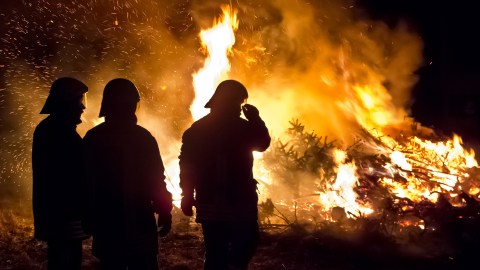WWIII Is Well Underway, Says Environmentalist Bill McKibben

“World War III is well and truly underway. And we are losing.” So writes environmental activist, author, and journalist Bill McKibben in a recent article for The New Republic. This is awar between humans and earth’s rapidly changing climate. His assessment begins with an overview of recent climate-induced catastrophes replete with martial metaphors:
In the North this summer, a devastating offensive is underway. Enemy forces have seized huge swaths of territory; with each passing week, another 22,000 square miles of Arctic ice disappears. Experts dispatched to the battlefield in July saw little cause for hope, especially since this siege is one of the oldest fronts in the war. “In 30 years, the area has shrunk approximately by half,” said a scientist who examined the onslaught. “There doesn’t seem anything able to stop this.”
In the Pacific this spring, the enemy staged a daring breakout across thousands of miles of ocean, waging a full-scale assault on the region’s coral reefs. In a matter of months, long stretches of formations like the Great Barrier Reef—dating back past the start of human civilization and visible from space—were reduced to white bone-yards.
Day after day, week after week, saboteurs behind our lines are unleashing a series of brilliant and overwhelming attacks. In the past few months alone, our foes have used a firestorm to force the total evacuation of a city of 90,000 in Canada, drought to ravage crops to the point where southern Africans are literally eating their seed corn, and floods to threaten the priceless repository of art in the Louvre.
The changing climate, McKibben observes, does not merely raise the risk of future problems; rather, it is already producing a dynamic set of devastating consequences: dramatic changes in global landscapes, mass extinctions, greater incidences of dangerous weather-events, and stark food-shortages. The frequency and scale of these threats and have indeed been increasing every year. For example, changes in global temperatures have culminated in the lowest amount of Arctic ice ever recorded in the month of June. As US environment correspondent Suzanne Goldenberg writes in The Guardian, “The Arctic sea ice extent was a staggering 260,000 sq km (100,000 sq miles) below the previous record for June, set in 2010.” In other words, the magnitudes of environmental tragedies have been steadily for many years.
With new disasters continually outdoing recent record-breakers, the outlook for both human and many non-human communities on earth looks bleak. The dangers are high and, in keeping with McKibben’s war-metaphor, a tumultuous climate is currently winning. Indeed, McKibben says that an outright victory is no longer a plausible outcome: “We’ve waited so long to fight back in this war that total victory is impossible, and total defeat can’t be ruled out.” Given that we are already suffering from severe consequences of climate change in the form of droughts, food shortages, and so on, it is difficult to argue with McKibben’s dismissal of the possibility of a perfectly preventative solution.
With the stakes raised and the outlook so dismal, McKibben finds – through the paradigm of war – analogous patterns of reaction from the 20th century:
For four years, the United States was focused on a single, all-consuming goal, to the exclusion of any other concern: defeating the global threat posed by Germany, Italy, and Japan. Unlike Adolf Hitler, the last force to pose a planetwide threat to civilization, our enemy today is neither sentient nor evil. But before the outbreak of World War II, the world’s leaders committed precisely the same mistake we are making today—they tried first to ignore their foe, and then to appease him.
World War II, like the war on climate, involved profound threats, which were initially faced with indifference. With the current rise of environmental catastrophes, McKibben hopes that individuals and governments can make a similar shift from apathy to an all-out commitment to overcome the dangers of climate change. Indeed, McKibben adds, “If Nazis were the ones threatening destruction on such a global scale today, America and its allies would already be mobilizing for a full-scale war.” A feasible response is not impossible, according to McKibben, but it will entail something like the all-hands-on-deck commitment that the United States displayed toward World War II – with the climate taking on the role of the “single, all-consuming goal.”
McKibben is not the first to use the language of militarism to describe the climate crisis. Political writer David Roberts wrote in an article for Common Dreams that an adequate approach to climate change seems “to demand something like wartime mobilization.” Even the Democratic Party, McKibben observes, has ratcheted up its rhetoric of concern:
In July, the Democratic Party issued a platform that called for a World War II–type national mobilization to save civilization from the “catastrophic consequences” of a “global climate emergency.” In fact, Hillary Clinton’s negotiators agreed to plans for an urgent summit “in the first hundred days of the next administration” where the president will convene “the world’s best engineers, climate scientists, policy experts, activists, and indigenous communities to chart a course to solve the climate crisis.”
While the 2016 Democratic Party Platform does indeed characterize climate issues with increased urgency, the likelihood of effective measures remains discouraging given Bill McKibben’s own experiences working with the party this year. He recounts:
In fact, one of the lowest points in my years of fighting climate change came in late June, when I sat on the commission appointed to draft the Democratic Party platform. (I was a Sanders appointee, alongside Cornel West and other luminaries.) At 11 p.m. on a Friday night, in a mostly deserted hotel ballroom in St. Louis, I was given an hour to offer nine amendments to the platform to address climate change. More bike paths passed by unanimous consent, but all the semi-hard things that might begin to make a real difference—a fracking ban, a carbon tax, a prohibition against drilling or mining fossil fuels on public lands, a climate litmus test for new developments, an end to World Bank financing of fossil fuel plants—were defeated by 7–6 tallies, with the Clinton appointees voting as a bloc. They were quite concerned about climate change, they insisted, but a “phased-down” approach would be best. There was the faintest whiff of Munich about it.
Continuing with the comparison to World War II, McKibben writes:
Like Chamberlain, these were all good and concerned people, just the sort of steady, evenhanded folks you’d like to have leading your nation in normal times. But they misunderstood the nature of the enemy. Like fascism, climate change is one of those rare crises that gets stronger if you don’t attack.
Nevertheless, McKibben does believe that there is still some hope if robust actions are taken quickly. Going further with his multi-faceted analogy with World War II, the next step is political leaders taking action. Even after his discouraging work with the Democratic Party, McKibben saw progress:
To my surprise, things changed a couple weeks later, when the final deliberations over the Democratic platform were held in Orlando. While Clinton’s negotiators still wouldn’t support a ban on fracking or a carbon tax, they did agree we needed to “price” carbon, that wind and sun should be given priority over natural gas, and that any federal policy that worsened global warming should be rejected.
Even in a period of a couple weeks, politicians demonstrate evidence of greater room for negotiation regarding how to act on the effects of climate change.
A war against climate change may seem more abstract or economically precarious than one against fascist dictators, but McKibben argues that it is neither. First of all, the ethics of fighting climate change are much more clear-cut, without the unconscionable acts of violence toward humans typical of war. Furthermore, a full-fledged commitment to climate issues only stands to bolster rather than hurt the economy, according to McKibben. In discussing the economic, social, and humanitarian benefits of climate change, McKibben lays out a promising vision:
It would save lives. (A worldwide switch to renewable energy would cut air pollution deaths by 4 to 7 million a year, according to the Stanford data.) It would produce an awful lot of jobs. (An estimated net gain of roughly two million in the United States alone.) It would provide safer, better-paying employment to energy workers. (A new study by Michigan Technological University found that we could retrain everyone in the coal fields to work in solar power for as little as $181 million, and the guy installing solar panels on a roof averages about $4,000 more a year than the guy risking his life down in the hole.) It would rescue the world’s struggling economies. (British economist Nicholas Stern calculates that the economic impacts of unchecked global warming could far exceed those of the world wars or the Great Depression.) And fighting this war would be socially transformative. (Just as World War II sped up the push for racial and gender equality, a climate campaign should focus its first efforts on the frontline communities most poisoned by the fossil fuel era. It would help ease income inequality with higher employment, revive our hollowed-out rural states with wind farms, and transform our decaying suburbs with real investments in public transit.)
Winning the war on climate change will not hurt the economy. Rather, McKibben stresses, it will improve it in addition to assuaging several other central social issues that may at first seem unrelated – such as socioeconomic, gendered, and racial issues.
So World War III is here, and there is a lot on the line. Still, McKibben reminds us there is still hope, and victory is possible if we take collective action against the one issue that unites all humans: the devastation of our irreplaceable blue planet




